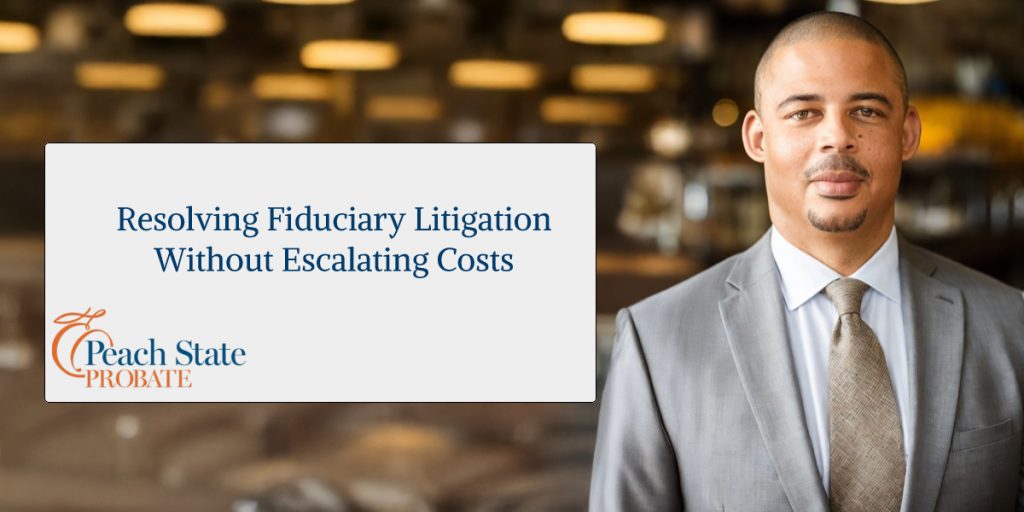## Navigating Fiduciary Litigation with Cost-Efficiency in Mind
Fiduciary litigation can be a complex and daunting process, particularly for individuals faced with disputes involving the management of estates or trusts. The financial implications of such disputes can escalate quickly, leading to significant costs that may deplete the very assets in question. For those involved in fiduciary litigation, understanding strategies to resolve these disputes without increasing expenses is crucial.
This article aims to shed light on how effective management of fiduciary litigation can mitigate costs while preserving the value of the estate or trust at stake. By focusing on preemptive measures and alternative dispute resolution techniques, parties can navigate fiduciary litigation with a practical mindset, ensuring that both legal and financial resources are used wisely and judiciously.
## Understanding Fiduciary Litigation
Fiduciary litigation arises when there is a dispute over the actions of a fiduciary, such as an executor, trustee, or power of attorney, who is legally obligated to act in the best interests of another party. These disputes can involve challenges to a fiduciary’s decisions, allegations of misconduct, or disagreements among beneficiaries about the management of the estate or trust. Such litigation can arise from complex family dynamics, differing interpretations of estate documents, or even allegations of fraud or breach of duty.
The legal framework surrounding fiduciary litigation is rooted in the duty of care and loyalty that a fiduciary owes to the beneficiaries. This means that when a fiduciary fails to adhere to these duties, litigation may become necessary to hold them accountable. Common issues that arise in fiduciary litigation include mismanagement of assets, failure to provide adequate accounting, and disputes over distribution of assets, all of which can necessitate formal legal proceedings.
Understanding the nuances of fiduciary litigation is essential, as it lays the groundwork for resolving disputes effectively. It is not merely about addressing grievances but rather about ensuring that fiduciaries uphold their responsibilities while enabling beneficiaries to understand their rights and responsibilities regarding the estate or trust.
## The Significance of Addressing Fiduciary Litigation
Addressing fiduciary litigation in a timely and efficient manner is of paramount importance, not only to protect the assets involved but also to maintain family relationships that can be strained by disputes. The emotional and financial toll of prolonged litigation can impact all parties involved. Thus, recognizing the significance of resolving these issues as soon as they arise can lead to better outcomes and reduced costs over time.
Furthermore, the implications of unresolved fiduciary litigation can extend beyond financial constraints. Protracted disputes can create animosity among family members or beneficiaries, leading to further legal battles that may be difficult to navigate emotionally and legally. A proactive approach to dispute resolution can help safeguard relationships and ensure that the estate or trust is managed according to the deceased’s intentions.
Lastly, navigating fiduciary litigation efficiently can reinforce the credibility of the fiduciary involved. A fiduciary who addresses disputes quickly and effectively not only fulfills their legal obligations but also enhances their standing in the eyes of beneficiaries. Such professionalism can foster trust and mitigate the potential for future disputes.
## Legal Framework and Context of Fiduciary Litigation Resolution
Understanding the legal framework that governs fiduciary litigation is essential for a successful resolution process. This framework emphasizes the duties and responsibilities of fiduciaries, which include adhering to the terms of wills and trusts, avoiding conflicts of interest, and ensuring transparency with beneficiaries. In Georgia, the laws governing fiduciary duties are detailed and specifically outline how fiduciaries should conduct their responsibilities.
The administration of estates and trusts is often regulated by both statutory law and common law principles, which elaborate on how fiduciaries should manage assets and communicate with beneficiaries. When a fiduciary fails to meet these obligations, beneficiaries may seek legal recourse under these laws. Understanding the available legal remedies, such as accounting requests, removal of fiduciaries, or claims for damages, is crucial for beneficiaries seeking to resolve disputes effectively.
Alternative dispute resolution (ADR) mechanisms, such as mediation or arbitration, may also be utilized within this legal context to resolve fiduciary disputes without resorting to traditional litigation. These methods can provide a more collaborative environment and lead to quicker resolutions at a lower cost, making them attractive options for parties involved in fiduciary litigation.
## Real-World Scenarios of Fiduciary Litigation
Real-world examples of fiduciary litigation illuminate the intricate nature of these disputes and highlight the importance of effective resolution tactics. One common scenario involves a trustee accused of mismanaging trust assets, leading beneficiaries to seek legal intervention to protect their rights. In such cases, beneficiaries may argue that the trustee has not acted in their best interest or that they have made impermissible investment decisions. The resolution can take many forms, including the trustee providing a full accounting or accounting improvements that satisfy beneficiaries’ concerns.
Another prevalent scenario arises from disputes regarding the distribution of an estate, especially when the decedent’s wishes, as articulated in their will, are ambiguous. For instance, if a will states that the estate shall be divided “equally among children,” but one child contributed significantly to the care of the parent before passing, disputes may emerge regarding what “equal” truly means. Mediation in such cases becomes effective, allowing the parties to negotiate terms that reflect the decedent’s true intent, preserving familial relationships and reducing costs associated with extended litigation.
Lastly, cases involving allegations of fraud against a fiduciary can lead to litigation that may escalate significantly. If beneficiaries suspect that a fiduciary has misappropriated funds or failed to disclose relevant information, swift legal action must be taken. Here, investigating the claims and, if appropriate, moving towards sealing agreements or restitution can resolve matters efficiently, minimizing costs and emotional distress.
## Proactive Steps to Address Fiduciary Litigation Issues
Addressing potential fiduciary litigation requires proactive measures that can prevent disputes from escalating. One critical step for fiduciaries is maintaining meticulous records of all transactions, decisions, and communications regarding the management of the estate or trust. This level of transparency can preempt allegations of mismanagement or negligence, as beneficiaries are more likely to feel secure in their fiduciary’s actions when they are well informed.
Beneficiaries should also take proactive steps by familiarizing themselves with the terms of the will or trust documents, as well as understanding their rights under the law. Open communication with the fiduciary can also greatly reduce misunderstandings and foster a collaborative relationship. When beneficiaries express their concerns directly and respectfully, fiduciaries may be able to address these issues without escalating to litigation.
When proactive measures fail, having a clear dispute resolution strategy in place can help. Exploring mediation or other ADR methods before resorting to court litigation can be an advantageous alternative, allowing both parties to have a say in the outcome. Setting a timeline and seeking out trained mediators can streamline the process and keep costs manageable.
## Common Pitfalls in Fiduciary Litigation Management
Fiduciary litigation can often become contentious, and several common mistakes can exacerbate disputes and increase costs unnecessarily. One notable pitfall is the lack of proper documentation and record-keeping by fiduciaries. Without maintaining comprehensive records of transactions and discussions with beneficiaries, fiduciaries may find themselves unable to justify their actions when challenged, leading to litigation that could have been avoided.
Another common mistake is failing to communicate effectively with beneficiaries. Poor communication can fuel mistrust and resentment, prompting beneficiaries to take legal action over seemingly minor grievances. Fiduciaries should strive to provide regular updates and actively involve beneficiaries in significant decisions to foster a sense of transparency and trust.
Additionally, engaging in adversarial or combative tactics during disputes can significantly escalate costs. Fiduciaries and beneficiaries often feel compelled to assert their rights aggressively, but taking a more collaborative approach can lead to better outcomes for all parties involved. By seeking mediation and approaching disputes with a problem-solving mindset, individuals can minimize both emotional and financial burdens.
## Timing: When to Consult a Legal Professional
Timing plays a crucial role in the decision to seek legal counsel during fiduciary litigation. Individuals should consider consulting an attorney when they sense a breakdown in communication with their fiduciary, as well as when a significant decision must be made regarding the management of the estate or trust. Recognizing that early legal intervention can prevent disputes from escalating is vital; addressing concerns before they explode into full-blown litigation often proves beneficial.
Another key moment for seeking legal guidance is when a fiduciary has not provided requested information or documentation. If beneficiaries are unable to review accountings or have doubts about the fiduciary’s actions, it is essential to consult with a legal professional who can advise on the appropriate course of action, which may involve formal requests or legal action.
Lastly, legal counsel is invaluable when parties enter negotiations or seek mediation. A knowledgeable attorney can guide both fiduciaries and beneficiaries in effectively communicating their interests, ensuring that the resolution process adheres to legal requirements while protecting their rights. Proper legal support can markedly reduce the likelihood of costly misunderstandings or subsequent litigation.
## Advantages of Legal Representation in Fiduciary Litigation
Navigating the landscape of fiduciary litigation can be intricate, and having legal representation offers several advantages. First and foremost, attorneys are well-versed in the complexities of fiduciary law, allowing them to provide invaluable guidance on navigating the legal system. Their understanding of applicable laws and local court practices can facilitate smoother processes and better outcomes for clients.
Legal professionals can also serve as negotiators and problem-solvers during disputes. Having an attorney represent your interests can help prevent escalation into litigation by keeping communication lines open and focusing on a solution-oriented approach. Moreover, legal counsel can help draft settlements or mediation agreements that reflect the parties’ interests while adhering to legal standards, reducing the chances of future disputes.
Additionally, in situations where litigation is unavoidable, having skilled legal representation can ensure that necessary procedures are followed and that your rights are safeguarded in court. An attorney can analyze the details of the case, present evidence effectively, and advocate on your behalf, all of which can significantly impact the favorable outcome of the litigation process.
## How Peach State Probate Facilitates the Resolution of Fiduciary Litigation
At Peach State Probate, we understand the intricate challenges posed by fiduciary litigation and offer tailored services to help clients resolve issues efficiently and effectively. Our knowledgeable team is committed to providing high-quality legal representation while strategically addressing disputes that may arise involving estates or trusts. By prioritizing communication and transparency, we work closely with fiduciaries and beneficiaries alike to understand their concerns and objectives.
We excel in utilizing alternative dispute resolution methods to help clients mitigate costs and reach negotiated agreements. Our focus on mediation allows us to create a collaborative environment where parties feel heard, fostering a greater likelihood of amicable resolutions. Engaging in mediation often reduces the emotional and financial toll of litigation, leading to satisfactory outcomes that align with our clients’ needs.
Furthermore, our extensive experience in fiduciary litigation equips us to assist clients in understanding their rights and responsibilities regarding estate and trust management. We take the time to keep clients informed on legal developments and encourage them to approach challenges with a proactive mindset. With Peach State Probate, clients have a partner dedicated to navigating the complexities of fiduciary litigation and guiding them towards effective resolutions that preserve their assets and relationships.




